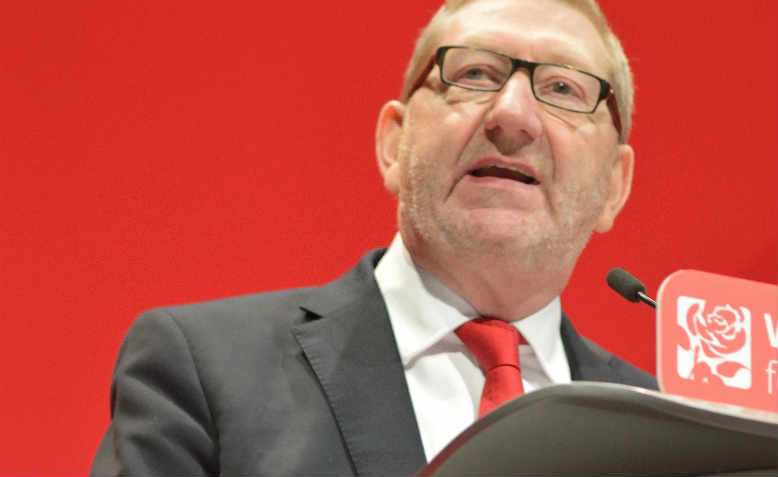 Len McCluskey speaking at the 2016 Labour Party Conference in Liverpool. Photo: Wikimedia/Rwendland
Len McCluskey speaking at the 2016 Labour Party Conference in Liverpool. Photo: Wikimedia/Rwendland
The liberal media is overplaying its hand in coverage of the Unite General Secretary election, writes the Angry Trucker
My Collins English dictionary defines ‘disingenuous’ as ‘not sincere; lacking candour’.
Will Hutton’s puff-piece in this week’s Observer (9 April 2017 – see link below), for the anti-McCluskey candidate in Unite’s current General Secretary (GS) election, provides a test case for this definition.
It is certainly candid: “another steady-as-you-go five years with Len is not good enough”; “he is the wrong man to take his union – and the Labour movement – forward”. To prove his point, he refers to the three retired trade union leaders who made a similar point in the Guardian last week. So, its back-to-the future with Gerard Coyne for Will. Some forward-looking vision.
But there are other problems with the candid, sincere, Will Hutton. One of them is the partial (in every sense) presentation of the facts: “Elect him [McCluskey] and membership will continue to drift downwards”, “The brutal truth is that trade unions need root-and-branch re-invention to attract new members” yet Hutton’s preferred candidate is the Regional Secretary for the West Midlands; how does his bailiwick stand in terms of recruitment to the union? Firmly mid-table is the answer given by the latest recruitment figures.
The regions setting the pace are the Southwest (possibly aided by the Hinkley Point development) – branch nominations supporting Coyne 5 (yes, five), McCluskey 127; London and Eastern for Coyne, 20, for McCluskey 226; and the Northwest – 14:179 to McCluskey.
Casualised
It looks like the reps and activists, who judge fine words by results in the workplace, strongly prefer McCluskey’s vision to Coyne’s. Hutton’s patronising assessment of my fellow Executive Council members (and the chairs of our National Industrial Sectors) as “admirable, even inspiring, people who know which way is up” ignores the fact that we have – virtually unanimously – endorsed McCluskey’s candidature – and yes, we ‘know which way is up’!
There is also a fundamental ‘disingenuous’ element to Hutton’s article. His feigned desire to see the re-emergence of a strong, powerful trade union movement is belied by his ‘solutions’. “Why not pilot the idea of the trade union as an employee mutual – acting as a form of employment agency for workers it supplies to ‘gig’ economy employers, but offering a job security they cannot provide?” – yeah, right, Will! Just which anti-union exploiter of casualised labour will give preference to applicants put forward by a trade union?
Wake up and smell the coffee, Will. There was a time when unions were powerful enough to insist that employers recruit from a list provided by the union. It was particularly prevalent in the docks, and car transporters. It was a way of opposing the employers’ use of the blacklist. It relied on the closed shop (i.e. 100% trade union membership) in the industry, and was made unlawful by the Tories, cheered on by liberal commentators who regarded ‘individual liberty’ as more important than collective strength. So no change there then. For all his liberal angst, the last thing Hutton wants is a self-confident, self-reliant trade labour movement.
Likewise, the probable low turnout that Hutton predicts, and laments, is the result of Tory laws insisting that trade unions (fundamentally collective, workplace-based organisations) are not allowed to ballot their members in the workplace, but must use postal ballots. This is designed to minimise collective discussion, maximise press interference (a la Hutton), and as a side-product, reduces the level of participation (i.e. lowers the turnout) – exactly the reasons they also insist on postal ballots for industrial action votes. Funnily enough, I don’t hear Hutton arguing against these laws.
Noble
This is because, lurking underneath the ‘more in sorrow than in anger’ approach, there is an understanding that our economy is predicated on class division, and Hutton realizes that “Anger and rage are rising”. Corbyn, McDonnell, McCluskey and their like are an expression, not a cause, of this rage. The social movements that Hutton derides are demonstrations of our growing awareness that we do not share in a mutual conversation based on eloquent argument or noble ethics.
The elite minority that run our world want us excluded from any such conversation. They want the right to hire and fire at will, to invade, or bomb, to suck profits from the elderly and sick, without interference from the great unwashed. This is Hutton’s mission, to return us to our cages, and let “responsible”, “realistic” moderates like Coyne (and his allies, Watson, Spillar et al) get on with having polite negotiations with the enemy. Changing nothing. Achieving nothing. But allowing the educated liberal intelligentsia to grieve over our miserable lot, and salve their liberal consciences.
Which is why he explicitly backs Coyne’s campaign as a necessary prelude to removing Corbyn and McDonnell from the Labour Party leadership: “their preoccupation is less with winning power than … turning Labour into an unelectable social movement”. This is both dishonest and insulting. It is noticeable that Hutton does not specify the Corbyn/McDonnell policies that are unelectable: the renationalisation of the railways? Kicking out the profit –chasing private sector from the NHS? Guaranteeing employment rights to workers from day one? Reinstating free access to Employment Tribunals?
What is certain is that a victory for Coyne would be a return to the bad old days of conciliation and compromise – always with us losing out. Hutton does not want to accept that his definition of ‘realism’ accepts in advance that the only change permissible is one acceptable to the powers that be. Hutton also lacks the honesty to admit his real fear: the collusion of political trade unionism with a genuinely progressive Labour government.

